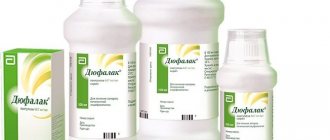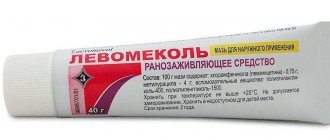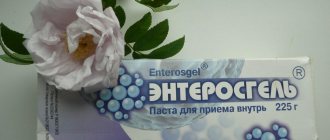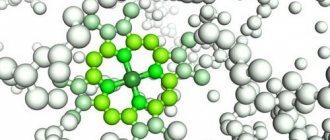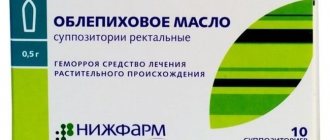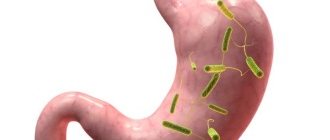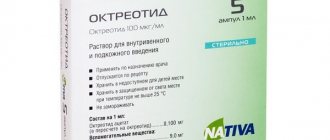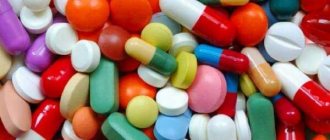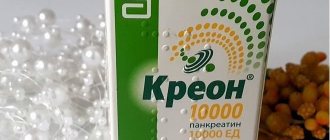Characteristics and beneficial properties of allochol
Allohol is a natural medicine based on dry bile, garlic and nettle extracts, and charcoal. The drug contains cholic acid, which helps restore the function of the mucous membrane in the production of bile. Garlic, having anti-inflammatory properties, helps relieve flatulence, fermentation and putrefaction.
These properties of allochol improve the flow of bile and, thereby, reduce inflammatory processes in the pancreas and slow down the formation of stones in the bile ducts. The drug has a positive effect on the liver and the patient’s digestion. When taken regularly, the medicine can reduce the pain symptoms of the disease to a minimum within a week.
The benefits of Allochol in the digestion and assimilation of food are ensured by targeted participation in the processes of bile formation and excretion. According to the main properties, the drug belongs to the following groups:
- cholekinetics - affect the tone of the muscular wall of the bladder and ducts, normalize contractions, the wave of peristalsis, and “push” the contents to the outlet into the small intestine at an accelerated pace;
- choleretics - provide stimulation of bile synthesis by liver cells, the necessary concentration of salt composition and water.
When determining the advisability of prescribing a drug and contraindications, the following should be taken into account:
- if there are already stones in the cavity of the bladder or the lumen of the canals, then increased contractions will create a dangerous increase in pressure, and when the stone moves, a painful attack or rupture will occur;
- in case of severe damage to hepatocytes during the acute stage of hepatitis, poisoning with toxic substances, the liver cells are exhausted, lose energy for recovery, undergo degeneration processes, the formation of foci of necrosis is possible, therefore, excess stimulation of bile formation will cause even greater inhibition of functions;
- reflex mechanisms are involved in the physiology of digestion, one of them is the production of secretion by the stomach and pancreas in response to the entry of a bolus of food into the esophagus, the release of bile into the small intestine, therefore, after absorption of the active components of Allochol, an increase in the amount of gastric juice and enzymes should be assumed.
As a result of using the drug, more bile with good fluidity is produced, salt precipitation and the formation of stones are prevented. An increased portion enters the intestines, which, together with enzymes, activates peristalsis and breaks down fat molecules. This action is used in medicine to prevent and treat obesity and the deposition of cholesterol plaques in atherosclerosis.
Thanks to their bactericidal properties, garlic and nettle destroy pathogenic intestinal flora, stop putrefactive processes and fermentation of waste. Activated carbon adsorbs toxic substances formed by insufficiently digested food on its surface and promotes removal in feces, since Allochol has a mild laxative property. The cleansing mechanism relieves bloating (flatulence) and helps with constipation.
By preventing the absorption of waste into the bloodstream, the drug prevents hepatocytes from being poisoned and relieves the liver. In case of inflammation, it creates favorable conditions for healing, relieves pain and a feeling of bitterness.
General characteristics of the drug "Allohol"
This medicine comes in the form of enteric-coated round tablets. Therefore, all its active substances are released in the duodenum, where they affect the digestion process.
The main component of the drug is dry bile. It activates the work of pancreatic enzymes, the process of bile formation and accelerates the breakdown of fats. In addition, the drug contains activated carbon, which binds and removes toxins. The remaining active ingredients of Allochol are extracts of garlic and nettle. Dry garlic helps eliminate bloating and eliminates increased gas formation. And nettle promotes a freer flow of bile and has an anti-inflammatory effect.
The drug "Allohol" has been known for a long time, and is very popular among patients. After all, it is quite effective, and its price is low. You can buy a package of 50 tablets for 30-50 rubles.
The drug in pharmacies
Allochol is available in the form of coated tablets. One tablet contains the following components:
- Dry animal bile – 80 mg;
- Garlic extract – 40 mg;
- Activated carbon – 25 mg;
- Nettle extract – 5 mg.
The tablets are packaged in blisters of 10 pieces or in dark glass bottles of 50 pieces. Cardboard packages may contain 1, 2 or 5 blisters.
In pharmacies you can find only one drug, which is a complete structural analogue of allochol. Allochol-UBF consists of the same active components. The possibility of replacing allochol with other choleretic agents should always be discussed only with your doctor.
Reviews
Most patients taking Allochol respond positively to it. The choleretic drug has been produced for more than 50 years and during this time it has managed to earn the trust of consumers. The popularity of Allochol is explained by both the natural composition of the drug and its low price, which makes it accessible to all categories of the population.
The few negative reviews are due to improper use of the drug and inflated expectations. A choleretic agent does not treat the underlying disease or eliminate its cause, but only improves the function of the affected organ and alleviates the symptoms.
The effect of allochol on pancreatitis
This choleretic drug contains several components: dried animal bile, activated carbon, nettle and garlic extract. Their effect accelerates the production of bile and its removal from the gallbladder, promotes the saturation of bile with water and prevents the development of inflammatory reactions.
When taking allochol, the functioning of not only the liver and biliary tract, but also other organs of the digestive tract: pancreas, stomach and intestines improves. Sufficient production of bile and its rapid removal from the gallbladder prevents its thickening and the formation of gallstones. In addition, the secretory function of the stomach and pancreas improves, and the breakdown of fats received with food is accelerated.
As a result of taking allochol, a patient with chronic pancreatitis eliminates digestive disorders - flatulence, constipation, bloating and various discomforts in the abdominal area. With long-term use of the drug, there is a decrease in pain, which often appears in such patients.
Allochol is a choleretic agent and has the following effects in pancreatitis:
- Prevents stagnation of bile and accelerates its outflow;
- Normalizes the functioning of the liver and bile ducts;
- Reduces the secretory load on the pancreas;
- Prevents the formation of gallstones;
- Eliminates digestive disorders: constipation, flatulence, heaviness in the stomach and other unpleasant sensations;
- Helps eliminate painful sensations.
In addition to the above cases, the drug can be prescribed for the treatment of the following diseases:
- Cholangitis;
- Cholecystitis;
- Cholelithiasis;
- Chronic hepatitis;
- Initial stage of liver cirrhosis;
- Constipation.
Main indications for use
Allochol is indicated for inflammation of the pancreas, which is accompanied by:
- stagnant processes in the biliary tract and impaired bile outflow;
- disruption of normal liver function;
- disorders of the enzymatic function of the pancreas;
- formation of gallstones;
- development of dyspeptic symptoms - pain in the abdominal cavity, constipation, diarrhea, etc.;
- pain syndrome.
Allochol can also be used as a prophylactic agent to prevent the development of exacerbations of pancreatitis. Improvement in the patient's well-being is observed approximately on the 5th day from the start of taking the drug. As a rule, constipation, bloating, and diarrhea disappear. Subsequently, the patient notes a decrease in the intensity of the pain syndrome.
Allochol is recommended for use during seasonal exacerbations of diseases of the digestive tract. It reduces the treatment of the underlying disease and improves health.
Prescriptions and contraindications
The main task of Allochol is to prevent complications of pancreatitis due to the possible entry of bile into the inflamed pancreas.
In addition, the medication is used for the treatment and prevention of the following diseases:
- liver cirrhosis in the initial stage;
- hepatitis of all types;
- chronic flatulence;
- regular constipation;
- cholecystitis;
- cholangitis.
Before taking the medication, you must consult your doctor. Taking Allochol is contraindicated in patients diagnosed with the following diseases:
- acute hepatitis;
- exacerbation of pancreatitis;
- calculous cholecystitis;
- peptic ulcer;
- acute enterocolitis;
- obstructive jaundice;
- liver dystrophy.
Treatment with Allochol is not allowed if the patient is allergic to one of its components.
In what cases is Allochol contraindicated?
Taking Allochol is strictly contraindicated for the following diseases:
- allergy to the components of the drug,
- acute stage of hepatic dystrophy, hepatitis, pancreatitis, enterocolitis,
- calculous cholecystitis,
- jaundice caused by obstruction of the bile ducts due to the formation of stones, tumors,
- large stones (10 mm or more, according to ultrasound) in the biliary system,
- peptic ulcer of the duodenum or stomach.
It is impossible to independently judge the advisability of taking Allochol. The choleretic effect of the drug may be unfavorable for various digestive disorders. Only a doctor can correctly determine the indications and dosage, therefore, before use, we recommend that you undergo an examination and obtain a medical recommendation.
Features of the use of allochol
The use of allochol improves the functions of the pancreas, liver and intestines in a short time. The drug is extremely tempting for patients with pancreatitis. The features of using this medicine are described depending on the stage of the disease, which will have to be taken into account before starting to take allochol for pancreatitis.
Is it worth taking allohol during the acute stage of pancreatitis?
In acute pancreatitis, inactive enzymes are activated under the influence of bile and begin to aggressively affect the pancreas. As a result, inflammation occurs. Thus, choleretic drugs are contraindicated in the acute stage.
The main effect of taking allochol is choleretic. Taking this drug in the acute stage of the disease will not improve the patient’s condition, but will cause irreparable harm. In this case, the medicine is strictly contraindicated.
Features of the use of allochol for chronic pancreatitis
In case of chronic pancreatitis, the use of allochol, on the contrary, will bring enormous benefits. Treatment with the drug must be carried out under the supervision of a gastroenterologist. The medication regimen and dosage should be strictly followed to obtain maximum benefit.
In the remission stage, the duration of taking allochol varies from three weeks to a month. It is prescribed to take the drug 3-4 times a day, 2 tablets. With exacerbation of chronic pancreatitis, the course is increased to two months. In this case, the dosage is 1 tablet 2-3 times during the day. After a quarter, treatment with this drug is repeated.
For children, the duration of taking the medicine is similar. The dose size and frequency of administration depend on the age of the child. For children under 7 years of age, half the full dose is recommended (one tablet 1-3 times a day). Patients over 7 years of age are prescribed an adult regimen and dosage.
After consuming allochol, the production of hydrochloric acid in the stomach increases. If it enters an empty stomach, the acid will corrode the mucous membrane and ulcers will form. Therefore, the use of the drug is allowed only after meals. However, this does not have to be a full meal; a small amount of food is enough.
How to use the medicine
Allochol is used as a component of complex treatment of chronic pancreatitis. The need to take it and recommended doses are determined by the attending physician.
When prescribing a course of treatment, the following factors are taken into account:
- individual tolerance of the drug and its components;
- patient's age;
- the patient’s health status and the presence of concomitant diseases;
- condition of the pancreas, liver and gallbladder.
If a person has no contraindications to treatment with Allochol, then it should be taken for at least a month. The tablets are taken orally, without fail after meals. Otherwise, irritation of the stomach walls may occur. A single dose is 1-2 tablets.
If, after taking Allochol, the patient experiences an exacerbation of pancreatitis, treatment is immediately stopped until the causes of the complications are clarified. 2-3 months after the onset of stable remission, a course of prophylaxis lasting 2-4 weeks can be prescribed.
Important information: Principles of treatment of pseudotumor pancreatitis
Allochol can be taken together with almost all types of medications.
This gives the following positive effects:
- improving the absorption of fat-soluble vitamins;
- better relief of constipation when taking laxatives;
- enhancing the effect of antibiotics;
- rapid pain relief together with analgesics.
According to the results of clinical studies, no contraindications were identified for the use of Allochol for children and women during pregnancy and lactation. The drug does not contain toxins or synthetic reagents. When it enters the bloodstream, it does not cause deviations in the development of the fetus and child. The single dose and duration of treatment are determined after a thorough examination of the patient.
As a rule, it is recommended to give children 2-3 times less medicine than adults.
Contraindications for use and side effects from using allochol
Allohol for pancreatitis is an effective drug that improves the condition and alleviates the painful and unpleasant symptoms that accompany the disease. The medicine is well tolerated and suitable for a wide range of patients. Considering the choleretic properties of the drug, you should not take it for the following diseases:
- acute pancreatitis;
- allergy to the components of the drug;
- liver diseases – hepatitis in acute form, liver dystrophy in the acute stage;
- ulcers;
- the presence of large stones with a diameter of 1 cm or more in the bile ducts and gallbladder;
- obstructive jaundice;
- enterocolitis in the acute stage;
- cholecystitis.
As a rule, allochol is well tolerated. Sometimes the drug exhibits rare cases of adverse reactions, especially in overdose. These include: allergies, diarrhea, dyspeptic symptoms, nausea, heartburn, itching. In extremely rare cases of violation of the rules of use, exacerbations of pancreatitis and ulcers of nearby organs occur.
Side effects
Allochol is usually well tolerated by patients. Undesirable reactions such as allergies, dyspepsia, diarrhea, burning behind the sternum, and itching rarely appear. Extremely rarely, Allochol can cause exacerbation of pancreatitis, gastric and duodenal ulcers.
Allergic reactions are different:
- itching;
- tissue swelling;
- hives;
- rash on the body;
- Quincke's edema, accompanied by rapid swelling of the face, lips, larynx;
- anaphylactic shock;
- disturbance of consciousness.
An overdose is usually accompanied by nausea, heartburn, diarrhea and itchy skin. The activity of liver transaminases may increase in the blood. These phenomena resolve on their own after discontinuation of the drug or dose adjustment and do not require specific treatment. In severe cases, symptomatic treatment is indicated.
The drug does not affect the ability to react quickly when driving vehicles or operating complex machinery.
special instructions
Allochol consists of natural ingredients and can be taken as prescribed by a doctor during pregnancy and breastfeeding. If any unpleasant symptoms appear, a woman should definitely consult a doctor to decide on the further advisability of taking the drug.
Allohol can be prescribed to children of any age. The dosage in such cases is determined by age and the nature of bile formation disorders. As a rule, children under 7 years of age are recommended to take ½ tablet 3 times a day, and after 7 years of age - 1 tablet 3 times a day.
When taking allochol, parents should ensure that the drug is not taken on an empty stomach, since in such cases it can provoke the development of digestive disorders, gastritis or peptic ulcers. If a child refuses the main meal, then before taking the drug you can offer him to eat fruit or baked goods.
While taking allochol, it is strictly forbidden to drink alcoholic beverages. In addition to the fact that drinking alcohol is contraindicated for pancreatitis and other diseases of the digestive system, its consumption causes accelerated production of digestive enzymes. When these circumstances and the actions of the drug components are combined, the patient experiences vomiting and diarrhea. In some cases, intense pain occurs in the gallbladder area, which can only be eliminated with medications prescribed by a doctor.
Contraindications and restrictions for taking Allochol
Before using Allochol, it is strongly recommended to undergo examination by a specialist. The presence of a number of diseases and lesions of the gastrointestinal tract can lead to a complete exclusion of the drug from your list of approved medications:
- individual sensitivity to components;
- hepatitis in aggravated form;
- cholecystitis;
- stomach ulcer;
- enterocolitis;
- hepatic dystrophy;
In most cases, the drug is well tolerated, and negative effects are not often observed when using it.
If you have an allergy or are experiencing symptoms that cause discomfort, such as diarrhea, belching, severe heartburn or a feeling of heaviness, then you need to stop taking the medication or reduce the dosage.
Allohol - instructions
How to take Allochol correctly is detailed in the annotation. The drug should be taken strictly after meals for 3-4 weeks. Tablets are taken as many times as a person has meals (3-4) 1-2 pieces as prescribed by the doctor. During the treatment of chronic pathologies, the duration of taking the medication, according to Allohol instructions, may increase to 2 months. If necessary, the course can be repeated after 12 weeks.
The duration of taking the drug for children, as for adults, is up to a month. How to drink Allochol (doses) is calculated by the attending physician for each child individually.
Allohol for cholecystitis
Cholecystitis is the process of inflammation of the mucous membrane inside the wall of the gallbladder. However, in almost 90% of cases, stones are simultaneously present. This option is called calculous. More often observed in women.
It has been established that the following negative factors influence the occurrence of cholecystitis:
- the most dangerous age is 50-60 years;
- poor nutrition - long breaks, overeating, passion for fatty, fried and spicy foods, alcohol, starvation diets;
- excess weight and lack of mobility;
- in women, pregnancy, taking hormonal contraceptives;
- nervous tension, stress disrupt the central regulation of tone and the outflow of bile, stagnation and infection of the contents occurs;
- past infectious diseases caused by viruses, bacteria, parasites;
- the presence of chronic hepatitis, liver cirrhosis, pancreatitis;
- trauma to the liver and bladder;
- the existence of chronic foci of infection in the body (carious teeth, tonsils, diseases of the genital organs).
Cholecystitis is provoked by a previous resection of the stomach or intestines due to an ulcer or Crohn's disease. In some families, the predisposition is inherited.
The disease occurs in acute and chronic forms. In the acute stage, the patient suffers from a sudden excruciating attack of pain in the hypochondrium on the right, radiating upward into the collarbone, into the scapula, into the right half of the abdomen, and vomiting with bitterness. The temperature rises. A change in the nature of the pain to pulsating is a signal of the beginning of purulent melting.
In the acute period, the use of Allochol is strictly contraindicated, because therapy requires adherence to a semi-starvation diet for 3-5 days. As digestion is restored, the doctor prescribes the drug 1 tablet three times a day. The course lasts up to a month. For chronic cholecystitis, treatment is carried out for up to two months at a dosage of 2 tablets 3-4 times a day.
For cholecystitis, Allochol helps:
- improve liver function;
- relieve the inflammatory reaction;
- prevent stagnation by diluting the concentration and accelerating the outflow of the contents of the bladder;
- coordinate muscle contractions of the bladder wall and ducts;
- dissolve the incipient formation of cholesterol stones.
The doctor will help you determine more accurately the duration of treatment and the advisability of repeating the course after 3 months.
Use for dyskinesia of the gallbladder
Dyskinesia is a disorder of the motor function of the gallbladder and transport channels. In origin, nutritional conditions and food quality, nervous regulation of the tone of muscle fibers, which ensures wave-like contraction of the walls of the biliary tract, are important. The disease occurs in adults and children against the background of nervous overload at work, at school, and disruption of diet.
Simultaneous use of allochol in combination with other drugs
When using allohol for the treatment of pancreatitis, the possibility of interaction of the drug with medications taken should be taken into account. The combination of incompatible substances will cause irreparable harm to the body. At the same time, the beneficial properties of some drugs, on the contrary, are enhanced.
Pay attention to the features of drug interactions:
- Use together with drugs containing aluminum hydroxide, cholestipol or cholestyramine is ineffective. These substances, reacting with beneficial acids, neutralize them.
- Use simultaneously with drugs that enhance bile production increases the positive effect of taking it.
- Simultaneous use with medications that have a laxative effect helps to get rid of long-term constipation.
- The use of allochol together with fat-soluble vitamins promotes their better absorption.
- In combination with antibiotics, the anti-inflammatory process is enhanced.
Thus, this drug can be taken with almost all known medications, with a few exceptions. Combination with many agents enhances the beneficial effects.
Compatibility of the drug with alcohol
Pancreatitis and alcohol are in themselves incompatible. One of the causes of the disease is alcoholic beverages. However, some people do not mind drinking 100 grams to relieve pain. No doctor would recommend this pain reliever.
And when performing therapy with Allochol, alcohol should be completely excluded. This is due to the fact that alcoholic drinks increase the production of gastric juice. The effect of the drug is similar, which when summing up the two effects leads to vomiting and severe stomach upset. If there was no pain in the right side, then the likelihood of their very pronounced appearance increases significantly. They can be relieved with painkillers. However, their prescription must be performed by an experienced doctor.
Diseases of the gastrointestinal tract (GIT) require a careful approach to complex treatment. Diet is considered the basis. It is the violation of nutritional rules that plays a major role in the exacerbation of chronic pathology and leads to the progression of the lesion. In case of gastrointestinal diseases, Allochol's action depends on the type of functional disruption; it is necessary to compensate for insufficient bile production in liver cells, help secretory organs, and restore fat metabolism.
The drug contains a healing herbal combination of garlic and nettle extracts, dry bile, and activated carbon. Able to influence the movement of bile through the outflow canals. The main properties allow you to eliminate stagnation in the biliary system and improve digestion. Taking the drug helps get rid of unpleasant symptoms. The rules for using Allochol are set out in the instructions; the effectiveness depends on their compliance.
Possibility of drinking alcohol during treatment with allohol
The course of treatment for pancreatitis with allochol is long. The minimum is 3 weeks, reaching two months. It is clear that during this period there are holidays and memorable dates on the calendar. The question arises about the possibility of drinking alcoholic beverages during treatment.
It should be borne in mind that alcoholic drinks increase the intensity of the glands. As a result, the production of gastric juice increases. Alcohol causes the body to produce an increased amount of bile and increases bile secretion. In combination with allochol, this will lead to serious diarrhea.
Drinking alcohol-containing drinks causes spasm of the biliary sphincters. In this case, bile, which is actively produced in increased quantities, will not be able to be released. Severe pain occurs. Therefore, during treatment with allochol it is strictly not recommended to drink alcoholic beverages.
Based on the above, we note: for pancreatitis, allochol is an effective, relatively safe natural remedy. Correct use of the medicine can improve the patient's condition. The use of the drug in the acute stage of the disease is strictly not recommended - there is a high risk of worsening the disease. It will be necessary to take into account contraindications and compatibility with other drugs. The decision to take allochol is agreed with the doctor. Then the use of the drug will help the patient improve the quality of life.
Use of the drug for various forms of pancreatitis
Taking Allochol leads to improved performance not only of the pancreas, but also of the intestines and liver in a short period of time. The drug has good recommendations for the treatment of patients with pancreatitis. The product has an immediate effect. However, before taking this medication, you must carefully study the description, since there are features of use at different stages of the disease.
Acute pancreatitis is characterized by the fact that the effect of bile on inactive enzymes leads to their activation. This negatively affects the functioning of the pancreas and leads to inflammation. This manifestation indicates that at the acute stage of the disease, choleretic drugs are contraindicated.
It must be taken into account that Allochol is a choleretic agent. Because of this, taking such a drug at the acute stage of pancreatitis is contraindicated.
At the same time, the use of Allochol in the chronic form of pancreatitis is not only recommended, but with such a course of the disease, the drug brings proven benefits. However, you should not prescribe drug treatment on your own. Therapy is performed only under the supervision of a gastroenterologist. In order for the effect of treatment to be maximum, both the dosage and the regimen according to which the drug is taken must be strictly followed.
When remission occurs, when the symptoms of the disease weaken, the drug should be taken three to four times a day, two tablets. The duration of use of the drug can reach a month. In cases where the chronic form of the disease worsens, treatment can last up to two months when taking one tablet two to three times a day. Three months after the end of therapy, the course must be repeated.
The treatment regimen and dosage of the drug for children over seven years of age are prescribed the same as for adults. However, medication administration for younger children is slightly different. Treatment periods remain the same. However, the dose should be reduced by half.
The drug is taken only after meals. This need arises due to the fact that the amount of hydrochloric acid after taking Allochol increases significantly. If such a chemical enters an empty stomach, ulcers may form. However, food does not have to be taken in full. Just drink a little water.
It should be remembered that the frequency of administration can only be determined by a doctor based on an examination. This takes into account both the nature of the course of pancreatitis and the individual characteristics of the patient, including his tolerance to the components of the drug.
Pregnancy and lactation
The specifics of prescribing the medication both during pregnancy and during breastfeeding are not indicated (for chronic pancreatitis).
Therefore, when breastfeeding, it is strictly prohibited to use the drug Allochol without a doctor’s permission. To clarify information about taking medication in the early and late stages of pregnancy, a consultation with a gastroenterologist is required in order to prevent negative effects on the formation of the fetus and the health of the mother.
Use in childhood
Children (up to 7 years of age) are allowed to use the medication for the treatment of both acute forms of diseases, including diseases of the gastrointestinal tract and liver (except for the acute form of pancreatitis), and chronic ones.
In the first case (acute form of the disease), the gastroenterologist prescribes a course of treatment according to the following scheme: half an Allochol tablet with plenty of water, after meals, without chewing, taken 2 to 3 times a day (depending on the number of meals the child has for the whole day) . The duration of the course for exacerbations is 1-2 months.
And in case of chronic disease, a child under 7 years of age, with the consent of the doctor, takes a course of medication as follows: 1 tablet of the medicine is taken with plenty of water, without chewing, 3 times a day (after breakfast, lunch and dinner, respectively). The duration of treatment in this case is 1 month.
For children over 7 years of age and for adolescents, the gastroenterologist selects a different treatment system. In case of exacerbations (except for the acute form of pancreatitis) of the above diseases, the doctor prescribes this regimen: 1 tablet of the drug is taken after meals, without chewing, with a sufficient amount of water 2 to 3 times a day. The course of treatment, depending on the dynamics of the patient’s condition, varies from 1 to 2 months.
In conditions of a chronic course of the disease, children after 7 years of age and adolescents are allowed to take the medicine according to this system: 2 tablets of Allochol are taken after meals with a sufficient amount of water 3 times a day. This course lasts 1 month.
Directions and recommendations for the use of the drug
Allohol is a completely natural drug, so a doctor may prescribe it when pregnant or during the lactation period. But you should be attentive to the state of your body and, if you have the slightest concern, immediately visit your doctor.
As for the question “can children take Allohol for pancreatitis?”, the drug is approved from a young age. The dosage depends on how impaired the outflow and formation of bile is. Typically, children under seven years of age are recommended to take half a tablet three times a day. Children over seven years old - a whole tablet three times a day.
Children should take the drug under close supervision from their parents. The medication should be taken only after meals. Otherwise, it can provoke the appearance of gastritis or ulcers, as well as seriously disrupt digestion.
When combining alcohol-containing drinks or tinctures with this medicine, the following are possible: severe nausea and diarrhea, as well as pain in the bladder area. At the first appearance of such symptoms, you should contact your healthcare provider for help.
During treatment with Allochol, you should stop drinking alcoholic beverages. They are contraindicated in case of pancreatitis and can cause serious disorders in the body.
Interaction of Allochol with other drugs:
- When taken together with diuretics, the secretion of the choleretic tract increases.
- When taking groups of vitamins, their absorption into the body improves.
- In combination with laxatives, they help eliminate the problem of constipation.
- It has a positive effect on the processes of eliminating infection and inflammation in combination with antibiotics.
opankreatite.ru
Release form of the drug
Allochol is available in the form of tablets coated with a hard shell, which prevents the drug from dissolving in the mouth or esophagus. The tablets are packaged in blisters with a capacity of 10 units each. Blisters are placed in cardboard boxes that contain 1, 3 or 5 plates. Another form of packaging is a jar made of dark thick glass. The jar contains 50 tablets. For the treatment of children, tablets with a reduced concentration of active components are produced. The drug should be stored in a cool place, the best of which is the refrigerator. The shelf life is 1 year. After the expiration date, the medicine must be disposed of.
Allohol and pancreatin: which is better?
It is difficult to choose the best drug from 2 drugs that act on the digestive system in different directions. The help of Allochol is necessary for pathologies of the liver and biliary tract. Pancreatin is indispensable for pancreatitis and gastritis, inflammation in the intestines. Both medications are well tolerated by patients, although Allochol, due to its multicomponent composition, has a longer list of contraindications and is also a cause of allergic reactions.
What is the effectiveness of drugs
Allochol in combination with Pancreatin should be used in patients diagnosed with chronic diseases of the digestive tract, liver and pancreas. The action of these drugs, classified as choleretic drugs, is aimed at stimulating the outflow of bile, which improves the digestion process. By including the missing enzymes, medications improve the absorption of vitamins.
Pancreatic dysfunction
When the pancreas becomes inflamed, the production of enzymes involved in digestion is disrupted. The digestive process in the human body is quite complex. In the stomach, food is first broken down by gastric juice containing hydrochloric acid. Next, the food enters the duodenum, where it is exposed to pancreatic enzymes and is finally broken down into nutrients.
With pancreatitis, the production of enzymes is disrupted, so food is poorly absorbed. In addition, each dose creates additional stress for the inflamed pancreas. That is why it is recommended that in case of acute pancreatitis, abstain from food for a while, and then follow a diet and take medications that help digestion. In addition to enzymes, one of them is often Allohol. For pancreatitis, it is needed to prevent stagnation of bile and improve the breakdown of fats. This helps the pancreas cope with its duties and improves the general condition of the patient.
Analogues of the drug
Analogs of Allochol include Vitanorm, Odeston, Tykveol, Ursoliv, Kholosas, Hofitol and other drugs. They may be recommended as an alternative to the treatment of pancreatitis. Main characteristics of medications:
- Hofitol is a drug with a choleretic effect, promotes accelerated formation of bile and subsequent excretion, reduces the concentration of urea and “dangerous” cholesterol in the blood. Contraindications: cholelithiasis, children under 6 years of age, bile duct obstruction, acute pathologies of the kidneys and liver.
- Odeston. The main indications are loss of appetite, repeated vomiting with pancreatitis, nausea and prolonged constipation - if they are caused by bile hyposecretion. It is acceptable to prescribe for the treatment of chronic pancreatitis. Not suitable for renal/liver failure or Crohn's disease.
- Ursoliv is a capsule release form. One piece contains 250 mg of ursodeoxycholic acid. The drug is classified as a hepatoprotector with choleretic action. Recommended for pathologies of the liver and pancreas. It is prohibited during the period of exacerbation of chronic pancreatitis, with obstruction of the bile ducts, pregnancy, lactation, and decompensated cirrhosis.
- Ursofalk – capsules and suspension, hepatoprotector. Against the background of pancreatitis, it is included in the complex treatment regimen. The dosage is selected individually. Contraindications: pregnancy, acute attack of inflammation of the pancreas.
Allohol for the treatment of pancreatitis is included in the composite treatment. Combined with enzyme medications, painkillers and other prescriptions. The instructions indicate the standard dosage; it can be increased on the recommendation of a doctor. If side effects develop, the drug is discontinued and replaced with analogues with the same therapeutic properties.
Sources: https://gastrotract.ru/bolezn/pankreatit/allohol-pri-pankreatite.html https://pankreatitu.net/blog/lekarstva/jelchegonnye/allohol https://medicalok.ru/podzheludochnaya/pankreatit/allohol- pri-pankreatite.html zheludokok.ru/pankreatit/allohol-pri-pankreatite.html https://pankreatit03.ru/allohol-pri-zabolevaniyah-zhkt.html https://pankreatit.guru/lechenie/preparaty/zhelchegonnye/alloxol https://pankreatit.pro/lechenie/preparati/allohol-i-pankcreatin https://diabetik.guru/medications/allohol-pri-pankreatite.html This material is exclusively subjective and is not a guide to action. Only a qualified specialist can determine an accurate diagnosis and prescribe treatment.
Last modified: 03/20/2020
Allohol for pancreatitis: can it be taken and what are its benefits?
Pancreatitis is characterized by severe inflammation in the pancreas, leading to its progressive damage. Enzymes do not enter the intestines for normal digestion, but remain in the pancreas.
From this it begins to self-digest. Allohol for pancreatitis is prescribed to regulate the functioning of the pancreas and prevent the development of complications. Ideal for the treatment of low-grade inflammation of the pancreas.
The benefits of allochol, its composition
This is a natural medicine that contains extracts of dry bile, garlic, nettle leaf, and charcoal. Available in tablet form.
The action of Allochol is explained by the presence of biologically active substances in its composition:
- Garlic contains a large number of components. They effectively lower cholesterol, kill microbes and prevent the formation of blood clots. Garlic promotes the transition of lipids to an emulsified state, subsequently removing them from the body. The extract of this plant prevents the development of fermentation in the intestinal cavity and fights bloating.
- Nettle contains vitamins, organic acids, phytoncides, carbohydrates, chlorophyll, tannins, microelements, incl. iron. The plant stops bleeding, increases bile production, reduces flatulence, and enhances the activity of digestive enzymes.
- Activated carbon effectively removes toxins.
- Dry bile includes organic acids - deoxycholic and taurocholic. They stimulate the production of bile by the liver and accelerate the emulsification of fats.
The substances that make up Allochol determine the following effect of the tablets:
- increasing the amount of bile produced and accelerating its movement along the biliary tract;
- improvement of digestion processes;
- elimination of atonic constipation;
- reducing the severity of the inflammatory process in the liver and biliary tract;
- improving the penetration of liquid into capillary vessels;
- reducing the amount of cholesterol and preventing its precipitation (thereby preventing the formation of gallstones).
Main indications for use
Allochol is indicated for inflammation of the pancreas, which is accompanied by:
- stagnant processes in the biliary tract and impaired bile outflow;
- disruption of normal liver function;
- disorders of the enzymatic function of the pancreas;
- formation of gallstones;
- development of dyspeptic symptoms - pain in the abdominal cavity, constipation, diarrhea, etc.;
- pain syndrome.
Allochol can also be used as a prophylactic agent to prevent the development of exacerbations of pancreatitis. Improvement in the patient's well-being is observed approximately on the 5th day from the start of taking the drug. As a rule, constipation, bloating, and diarrhea disappear. Subsequently, the patient notes a decrease in the intensity of the pain syndrome.
Allochol is recommended for use during seasonal exacerbations of diseases of the digestive tract. It reduces the treatment of the underlying disease and improves health.
Features of the use of allochol
The method of taking the medicine depends on the form of the disease, its duration, and the presence of concomitant diseases. The usual dose for an adult is 2 tablets 3 or 4 times a day. If necessary, it can be reduced or increased.
In acute pancreatitis, enzyme substances under the influence of bile are activated and begin to destroy the organ. Therefore, in the acute stage of inflammation, Allochol is contraindicated. Its use not only does not improve the patient’s condition, but also causes serious harm to him.
In the chronic form of the pathology, the use of Allochol is beneficial for the patient. It is better if he is treated under the supervision of a therapist. It is necessary to strictly follow the treatment regimen and dosage in order to achieve maximum benefit.
During remission, the duration of use of the medicine is 3-4 weeks. The dosage is selected depending on the patient's condition. In case of exacerbation, the time of taking the medication increases to 2 months.
After taking the medicine, the stomach begins to produce large quantities of hydrochloric acid. It eats away at its walls, causing ulcers to form. To prevent this from happening, you need to take the medicine after meals.
Side effects
Allochol is usually well tolerated by patients. Undesirable reactions such as allergies, dyspepsia, diarrhea, burning behind the sternum, and itching rarely appear. Extremely rarely, Allochol can cause exacerbation of pancreatitis, gastric and duodenal ulcers.
Allergic reactions are different:
- itching;
- tissue swelling;
- hives;
- rash on the body;
- Quincke's edema, accompanied by rapid swelling of the face, lips, larynx;
- anaphylactic shock;
- disturbance of consciousness.
An overdose is usually accompanied by nausea, heartburn, diarrhea and itchy skin. The activity of liver transaminases may increase in the blood. These phenomena resolve on their own after discontinuation of the drug or dose adjustment and do not require specific treatment. In severe cases, symptomatic treatment is indicated.
The drug does not affect the ability to react quickly when driving vehicles or operating complex machinery.
Contraindications
Since Allochol has choleretic properties, it is prohibited to use it for the following pathologies:
- acute pancreatitis;
- allergic response to the ingredients of the medicine;
- acute inflammation of the liver;
- acute dystrophy of liver tissue;
- peptic ulcers;
- the presence of large stones (more than 1 cm in diameter);
- jaundice due to blockage of the bile ducts;
- acute form of enterocolitis;
- inflammation of the gallbladder.
The medicine is not prescribed for children.
During pregnancy, the use of the drug is possible only after the approval of the attending physician.
Combination of allochol and other drugs
When treating pancreatitis, it is necessary to take into account the patient's intake of other medications and their effect. If the patient takes incompatible drugs, he will cause irreparable harm to the body. Some medications for pancreatitis, on the contrary, enhance the effect of the components found in Allochol.
You should pay attention to the following features of drug interactions:
- The use of products that contain aluminum hydroxide makes Allohol ineffective for pancreatitis. This occurs due to the neutralization of the action of stomach acids.
- The use of choleretic drugs for pancreatitis enhances the effect of Allochol.
- Prescribing laxatives with Allochol during the treatment of pancreatitis helps to get rid of constipation faster. If the patient suffers from severe constipation, then experts recommend a combination of Allochol with medications that facilitate bowel movements.
- If you drink Allohol in combination with fat-soluble vitamins, you will notice an improvement in their action.
- Allochol potentiates the effect of antibiotics.
Drinking alcoholic beverages provokes spasm of the biliary sphincters. Bile produced in large quantities cannot be secreted, which causes very severe pain. Based on this, drinking alcohol during treatment is strictly prohibited.
It is prohibited to use Allochol for pancreatitis simultaneously with medications that contain cholestyramine and colestipol. In case of exacerbation of the underlying disease, it is better to discontinue Allochol until the condition normalizes.
Storage conditions and shelf life
The drug retains its properties for 4 years from the date of production. After this period, its use is strictly prohibited. The drug should be stored at room temperature. The place where the medicine is located should not be accessible to children.
Allochol is an effective remedy for the prevention and treatment of inflammatory pathologies of the pancreas. It must be used in accordance with the doctor's instructions. Usually, subject to diet and medical recommendations, it is possible to achieve stable remission and prevent the development of pancreatic diseases.
Source: https://zdravpechen.ru/prochee/allohol-pri-pankreatite.html

